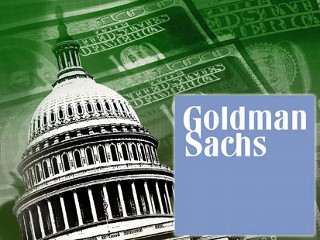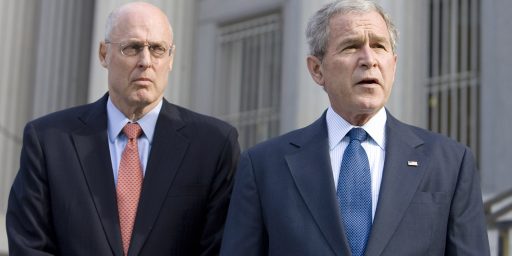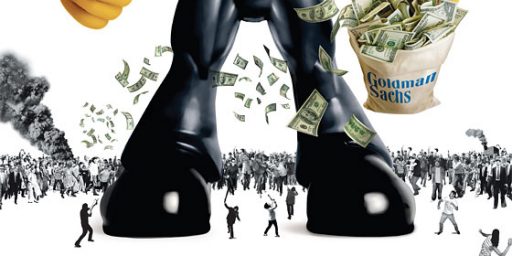Goldman Sachs Fraud Case
 As readers are likely aware by now, Goldman Sachs was yesterday charged with fraud by the Securities and Exchange Commission. I’ve resisted comment thus far, as I’ve been tied up with a minor crisis at work and don’t have any especial expertise in the vagaries of securities law, anyway. But here’s what we know thus far.
As readers are likely aware by now, Goldman Sachs was yesterday charged with fraud by the Securities and Exchange Commission. I’ve resisted comment thus far, as I’ve been tied up with a minor crisis at work and don’t have any especial expertise in the vagaries of securities law, anyway. But here’s what we know thus far.
WaPo (“SEC accuses Goldman Sachs, Fabrice Tourre of defrauding investors“):
The Securities and Exchange Commission filed fraud charges against Goldman Sachs on Friday, alleging that the famously successful but vilified Wall Street bank sold investors a subprime-mortgage investment that was secretly designed to lose value.
In filing the civil suit, the agency targets one of the few banks that, with the help of taxpayer bailouts, emerged from the financial crisis stronger than before. The case strikes at a main cause of the financial crisis: the creation of investments derived from home loans made to borrowers who couldn’t afford the houses they were buying.
But the suit, which alleges that Goldman Sachs misled its clients, goes beyond, raising the possibility that the bankers who devised these investments knew they were selling toxic financial products that could endanger the financial system but were concerned only with the fees they would earn by doing so.
[…]
Months before the mortgage investment was marketed, a senior Goldman Sachs executive recognized in an e-mail that the implosion of the housing market was imminent. “The whole building is about to collapse anytime now,” concluded Goldman Sachs vice president Fabrice Tourre, who allegedly created the investment at the core of the case.
The SEC suit also drags into a legal maelstrom the legendary hedge fund manager John Paulson, who personally earned billions of dollars as his firm Paulson & Co. bet against the housing market as it went bust. The fund was a central actor in the alleged fraud, but officials say Paulson did nothing wrong.
Goldman Sachs denied the SEC’s allegations. “The SEC’s charges are completely unfounded in law and fact, and we will vigorously contest them and defend the firm and its reputation,” the bank said in a statement.
[…]
In its case, the SEC alleges that Goldman Sachs created and marketed a financial product known as a collateralized debt obligation, often referred to as a CDO, whose value was linked to that of home loans. The agency claims that Goldman Sachs didn’t tell investors that Paulson & Co. helped the bank assemble the CDO while the hedge fund at the same time placed bets that it would lose value.
“The product was new and complex, but the deception and conflicts are old and simple,” SEC enforcement director Robert Khuzami said in a statement. “Goldman wrongly permitted a client that was betting against the mortgage market to heavily influence which mortgage securities to include in an investment portfolio, while telling other investors that the securities were selected by an independent, objective third party.”
WSJ (“Goldman Sachs Charged With Fraud“):
The civil charges against Goldman and one of its star traders, 31-year-old Fabrice Tourre, represent the government’s strongest attack yet on the Wall Street dealmaking that preceded, and some say precipitated, the financial crisis that gripped the nation and the world. Goldman’s shares fell 13%, one of the steepest slides since the firm went public in 1999, erasing some $12 billion of market capitalization.
[…]
Mr. Paulson and his firm aren’t named as defendants. The hedge-fund firm said in a statement that it wasn’t involved in marketing the bonds to third parties. “Goldman made the representations, Paulson did not,” Mr. Khuzami said.
[…]
The deal at the center of the SEC suit came as Goldman and other firms were deeply involved in making, buying and building complex investments out of subprime loans, just as the market for those loans was beginning to weaken perilously. Critics of such deals say they enriched the firms but magnified what became the worst financial crisis since the Great Depression.
Goldman has issued a press release attempting to rebut the charges. Their topline arguments:
• Goldman Sachs Lost Money On The Transaction. Goldman Sachs, itself, lost more than $90 million. Our fee was $15 million. We were subject to losses and we did not structure a portfolio that was designed to lose money.
• Extensive Disclosure Was Provided. IKB, a large German Bank and sophisticated CDO market participant and ACA Capital Management, the two investors, were provided extensive information about the underlying mortgage securities. The risk associated with the securities was known to these investors, who were among the most sophisticated mortgage investors in the world. These investors also understood that a synthetic CDO transaction necessarily included both a long and short side.
• ACA, the Largest Investor, Selected The Portfolio. The portfolio of mortgage backed securities in this investment was selected by an independent and experienced portfolio selection agent after a series of discussions, including with Paulson & Co., which were entirely typical of these types of transactions. ACA had the largest exposure to the transaction, investing $951 million. It had an obligation and every incentive to select appropriate securities.
• Goldman Sachs Never Represented to ACA That Paulson Was Going To Be A Long Investor. The SEC’s complaint accuses the firm of fraud because it didn’t disclose to one party of the transaction who was on the other side of that transaction. As normal business practice, market makers do not disclose the identities of a buyer to a seller and vice versa. Goldman Sachs never represented to ACA that Paulson was going to be a long investor.
Steve Bainbridge, who knows a little something about corporate law, has the cynical take that, “It was inevitable that the government would go after one of the big investment banks for their conduct during the run up to the credit crisis. Someone must be thrown to the lions so that the polis are distracted from the role their government played in the fiasco.” But he rounds up reactions from three others who think the SEC has a pretty solid case here. Which seems reasonable enough, in that the SEC gets to choose its cases and isn’t likely to go after an adversary with enormously deep pockets unless it thinks it can win.
Leaving aside the law for now — again, this is complicated and well outside the legal coursework I had as a political scientist — and looking at the ethics, it wasn’t entirely clear to me from reading the press accounts what Goldman did that was wrong. I get why people are angry at Goldman Sachs, of course. They’ve behaved arrogantly and profited from a massive financial collapse that’s caused widespread devastation and to which they contributed.
But at first blush it sounds like they acted in precisely the manner we’d expect from a massive investment bank: hedging their bets, ensuring that they’d come out ahead regardless of whether the subprime market crashed. Yes, they had more information than did the average investor but, then again, when doesn’t an investment firm? Yes, Tourre seemed to think the whole thing was going to blow up. But, surely, he’d have been better off simply getting out of the subprime business if he were sure of that? Instead, he made a side bet the old fashioned way: With other people’s money.
UNM lawprof Eric Gerding explains why that’s probably not right.
The allegations are that a large hedge fund, Paulson & Co., pushed Goldman to sell a CDO to investors. The hedge fund allegedly (a) played a large behind-the-scenes role in helping Goldman structure and select the assets (collateral) that backed the CDO, and then (b) bought a number of credit default swaps that “shorted” the CDO. The SEC alleges that Goldman told neither investors nor the CDO’s collateral manager (akin to the investment manager for the CDO) of Paulson’s role in selecting assets or its short position — which would suggest a conflict of interest. It is hardly shocking that a securities law case boils down to disclosure.
Kevin Drum‘s explanation makes some sense in this regard:
Goldman claimed that the securities bundled into Abacus had been chosen by independent managers, but in fact they’d been carefully cherry picked by hedge fund manager John Paulson, who selected the crappiest mortgage bonds possible because he wanted to bet against them. Goldman apparently thought that was a fine idea, because they wanted something to bet against them too. So a synthetic CDO purposely designed to do poorly seemed like a great idea.
But I gather that Paulson isn’t being charged with diddly. Why is he allowed to establish and market an intentionally bad investment vehicle and walk away with billions, while Goldman is held liable?
Gerding makes a good point, too, that we’re all well served to heed:
It is important to note that all of the foregoing are from the SEC’s statements. Let’s see if the SEC’s version of the facts holds up. Everybody should get their day in court, even institutions Rolling Stone writers hate.
Everyone’s behavior looks worse in the charging document than in reality, as it’s designed to state the absolute strongest case against the accused and omits every shred of exculpatory evidence.






The important thing to note is that the whole transaction would have been illegal ten years ago, before the CFMA was passed. Prior to CFMA you could not trade in derivatives unless you were hedging the underlying security. After CFMA, you could trade derivatives on anything, whether you were hedging the underlying security or not. Congress enabled this behavior by deregulating the market.
“Congress enabled this behavior by deregulating the market.”
At the request of the financial industry. This is how unregulated financial institutions work. In this case, government abdicated its responsibility. Randian beliefs that businesses will self-regulate best are difficult to defend when we see how they actually behave.
Steve
It is very clear to me that what Goldman did was morally wrong. They misrepresented both the quality of their investments and their goal in creating them
If you are going to give a clean call on someone making a “designed to fail” security, and then selling it as (of course) “designed to succeed,” then what have you got left? What exactly is your moral standard?
(Additional topics are (a) choosing Goldman, who seemed too strong to be judged in this political climate, and (b) the probably interesting reaction from the Tea Party group, who if true to their stated goals, should be all over in favor of this.)
(Two takes, that come from opposite ends of the spectrum, line up on this. Read Simon Johnson and then read Tyler Durden.)
I think it goes beyond morally wrong. People pay Goldman Sachs for investment advice. They have a fiduciary duty to look out of the best interests of their clients. When they deliberately sell clients on investments they knew (or should have known) were bad for the benefit of a third party, they’re engaging in fraud.
Right Stormy, that fiduciary duty is one reason this looks to be illegal under current law.
Per my reading, it hinges on Paulson being a party to Goldman’s misrepresentations. Paulson might say “make me some securities that will likely fail” and that may not be illegal, I guess. On the other hand, Goldman saying “look at these great securities” without saying “which we know to be designed to fail” is probably illegal under current law.
Also, the SEC might be just waiting to see to what degree Goldman tries to implicate Paulson as they try to save themselves. From a purely strategic viewpoint, successive cases make more sense.
The Corporate Elites, Financial Oligarchs, Soros, Magnetar, John Paulson, etc.,etc. with the help of our political class,Barney Frank, Ram Emanual,Georgie Bush, Barry O,etc.,etc.(who all are willing to sell out nation for a few thousand dollars of political contributions)are now,all in the process of systematically looting the nation financially. Before the system implodes for good in about 30 to 60 months from now.
And we the middle class look on “slack jawed and blank eyed” while it happens in plain sight,right in front of us. It’s a hell of a world.
People dislike Frank, but he does generally propose more regulation than the average semi-corrupt congressman. His defenses of Freddy and Fannie were at a minimum “in error” though.
I think the wheels could be coming off the cart on a lot of this. Pro Publica and This American Life did a bit on other entities designing CDOs to fail just last week.
Pro Publica’s headline today is Other Major Banks Did Deals Similar to Goldman’s
Obama has seemed very friendly to bankers over this last year. Now I think we’ll see if he wants to stand by them.
If there’s any criminality involved, perhaps he has a grant for his testimony, etc.
If you still don’t get it James, Dylan Ratigan explains.
Man, I don’t know how you pulled from your sources: “and looking at the ethics, it wasn’t entirely clear to me from reading the press accounts what Goldman did that was wrong.”
Obama has seemed very friendly to bankers over this last year. Now I think we’ll see if he wants to stand by them
John Persona
I have dealt with politicans of both parties on a professional basis for 40 years. Barney Frank is a slime bag of the first order.(But then so is georgie Bush(the entire Bush family is in a refined preppy sort of way), barney is just more obvious).
Obama was financed by these crooks. So now we are going to have a little “Kabuki” theater performance about how the administration is going after the wrong doers. For instance check the flow of political money to Ram Emanuel over the last few years. Start with a hedge fund group called Magnetar.
You are probably a liberal, I’m a conservative. It doesn’t make any difference. This crowd of creeps,who now have control of our Nation are going to give us both an equal opportunity screwing. To them ALL that matters is the money( a billion or so at the time). You and I are just cannon fodder.
I’ve taken a number of on-line tests that put me reliably in that rarest position in American politics: the moderate center. Based on my distant view, and without personal experience, I see Frank proposing some sensible things.
Now, perhaps your closer and more cynical view will hold. It is possible Obama will stand by the banks, but heck even if he was financed by them, it was politicians who invented the metaphor thrown under the bus.
Bainbridge is correct, here. The fact of the matter was, and remains, that none of the current credit crisis or the bank’s responses to it would’ve been possible or even likely without the government’s actions in trying to provide loans to people who couldn’t afford them. You know the group were talking about; people likely to vote Democrat. The object now is to pin the blame on somebody other than governmental actors.
Deregulation of the market, as Baker points to, is not the cause here. Deregulation of that area would not have been required to keep things afloat, if the government regulations hadn’t stopped the banks with bad loans that they didn’t want to give out in the first place.
And persona, given your ultra-reliably far left stance on just about anything that moves in here, you’ll forgive me if I don’t take your statement as regards online tests at face value.
Is there anyone here who isn’t left from your position Eric?
http://www.politicalcompass.org
Have fun.
“that none of the current credit crisis or the bank’s responses to it would’ve been possible or even likely without the government’s actions in trying to provide loans to people who couldn’t afford them.”
There arent many people still pushing the meme that loans to a few poor minorities brought down the world economy. It was a good campaign ploy, but it as seen as a minor factor by almost everyone now. If you look over the data those loans have not performed significantly worse, sometimes better (last time I looked). Besides, there was not enough money in it to cause the many trillions we lost. It was multifactorial, requiring many steps. Deregulation (leveraging limits were greatly raised) and regulatory capture (read Black’s book, hell read anyone’s book on this area) are considered a significant factor, not the only one, by most also. All explanations should include timing and the international nature of the crisis.
Steve
Yep. Disclosure draws the line between the investors being victims and co-conspirators in greed.
Ah the view from the world is flat crowd.
It’s very clear that the banks were eager to make bad loans, as there was a great deal of money to be made. The more predatory the loans, the greater the profit. Bundle up the bad loans and sell them to some sucker.
Not to say that the government, both GOP & Democratic, did not play their part. But clearly, greed in the banking and mortgage sectors, especially on the part of senior leadership, played a huge role in this train wreck.
And while we’re assigning blame, let’s not forget Chris Cox, the canned ham of a Randroid W put in charge of the SEC… and during whose tenure I believe not a single investigation was started. Even when staffers were screaming about Madoff, Cox refused to do anything about it. Which is, of course, why W had put him there in the first place.
Now I hear talk radio clowns screaming about how outrageous it is that the SEC is only now onto the Goldman Sachs criminal conspiracy, and saying that’s proof that Obama is incompetent.
Obama is the guy with the shovel. W was the one with the elephants. You figure out where the mess came from.
Obama is the guy with the shovel. W was the one with the elephants. You figure out where the mess came from.
WR
Bush 1, Clinton, Georgie Bush, now Barry Obama all equivalent to late Roman Empire Emperors….perfumed, incompetent, corrupt idiots.
My guess is,Barry will turn out to be our version of Emperor Valens,if so the shovel or Goldman Sach’s money won’t do him or us much good.
Because they wanted to play along with the government who held the future of those banks in there very powerful hands. They were informed on no uncertain terms that the government would not look kindly on NOT playing along with the current political wind.
Greed? Certainly. Buying votes is one symptom of such.
Of course. And those six & seven figure bonus checks bankers were pulling in played no part. Mortgage brokers that were making 25K a month off making half million dollar loans to maids and busboys were doing it ONLY because the evil Democrats forced them to at gunpoint.
Tell us bit, were evillll Muslims involved somehow too?
At this point in our history, only a fool does not realize that corporations influence government as much as the other way around. Oh, wait, I am talking to bithead, who seems to have forgotten just how quickly the government started dropping off truckloads of cash at those same banks the minute the CEOs said they were in trouble.
No Reagan. He’s the one who started this Crony Capitalism.
The primary problem here was stupid consumers, with no financial self-discipline, eager to have something they could not afford, who either didn’t pay attention in high school when the subject of interest payments was discussed or else attended a school where this was not taught. Learn to read a contract and understand the fine print. Some things never change, no matter whether it’s a used car or the most significant purchase you may make in your life, and caveat emptor is one of them.
Nothing is defferent now fundamentally. The mandate by Congress to provide loans to a certain economic demographic of the population is still in place.
“Because they wanted to play along with the government who held the future of those banks in there very powerful hands. They were informed on no uncertain terms that the government would not look kindly on NOT playing along with the current political wind.”
🙂 The banks have owned the politicians for quite a while. They ignore or pay their way out of whatever they want. Your implication that government officials work independently is kind of touching as you seem to be standing up for the honesty and integrity of our elected officials. I suggest you read more.
“The primary problem here was stupid consumers”
1) In a non-recourse loan, you can walk away anytime you want and the bank eats the loan and gets the house. In that scenario who is stupid when it comes to a 120% mortgage, the bank or the consumer.
2) The bankers made billions if not trillions off of these loans. Did you miss the part about record bonuses every year? Follow the money trail. The consumers are foreclosing or out of their homes. The consumers are out of jobs. The banks are back to major profitability.
Steve
Eric, that line about government forcing loans is wrong, but it’s also funny that it is the “one-trick pony” response.
Somebody says crisis, you bring up the one contributing factor that you can deal with, no matter how small it was. It fits your head.
Now, if I was going to step back and look at this from the broad perspective of markets and governments, I’d say the Goldman deal illustrates why I support free markets with just enough regulation. No more.
Things like truth in advertising are not very invasive. They are pretty simple. They work. They don’t turn the world “socialist.”
I don’t know. James either didn’t look at this too deeply, or he actually had the gut response that no, your bank doesn’t have to tell you the truth.
and
What is it about the left and the illusion that the government is only here to help us, and is immune to such base things as greed?
Here’s a concept that’s probably a little beyond your reasoning ability; The truth doesn’t change.
did you, in turn, notice the number of banks that have failed in this environment? Apparently are missing part of the equation here. The only banks that were turning record profits, were the ones that were playing along with the government’s intentions as regards home loans and loosening of requirements thereof. It was the government that forced the banks of side the realm of common sense banking, and common sense lending. They did so was specifically to buy votes. No two ways around this one. The ones that played along, got along with the government, and we’re specifically paid off in terms of bailouts. The ones that didn’t, well, look at the number of bank failures . They almost exactly correspond to the number of banks that didn’t play along with the grand scheme of the left.
Eric, it’s simple: the entities you claim were forced to make the loans, weren’t the ones making the trillions of bad loans.
This did not come from nice local bankers like our friends here at OTB. This came from loan brokers, who were sometimes even felons who changed trades when they saw this was where the money was. The loan brokers made the loans because incentives matter. They made commission. The loan aggregation make their dime. The brokers who sold the risky bonds made theirs. The investors who bet against the risky investments made theirs.
I’d actually put the last group of “shorts” on the side of Angels, as long as they didn’t ask for more specifically “bad” loans to bet against.
(In case it is slow to dawn, last year we were asking “why would banks make no-doc loans to people with no income?” “Can they be that dumb?”
We now know, by this Magnetar/Goldman story line that they were looking for those sorts of people, specifically so that their loans would fail.
Put that in your “markets self-regulate” pipe, and smoke it.)
Eric F — Even when banks have failed, you’ll find BANKERS have walked away with tens of millions. Some of these practices were terrible for the institutions in the long run but were fabulously profitable for the people who ran them. Bankers got seven or eight figure bonuses. If that mean the banks’ stockholders would take it in the shorts a couple of years down the line, oh well.
Ummm… where did I EVER say there is no greed in the government? Did the dog eat your homework again?
Take for example WAMU CEO Kerry Killinger, who put huge pressure on the mortgage division to make shaky but profitable loans. He walked with over 100 million. All those folks who lost their homes… tough sh_t.
So the Bush bank bailouts where actually part of the lefts evil scheme? That Nancy and her mind control rays again. What a minx!
That’s simply untrue.
It’s an assumption we make when we turn over the power you claim bankers abused, to government, on the illusion that such a move will solve the problem. Government is the problem, here, not the solution.
gas, let’s look at Killinger shall we? WAMU Was treated somewhat more roughly by regulators, simply because they weren’t playing the game correctly. At least, in the view of the powers that be in Washington. Watch the way things went down with WAMU versus how they went down with the very democrat friendly CITIgroup, as an example… or BOA for another example. as far as I’m concerned there was many real clear moral justification and there certainly was not a clear legal justification for the difference in the way those organizations were treated. There is but one reason that they were treated differently; financial support for democratic campaigns and adherence to the leftist mantra.
argue if you will that these all should have been treated as WAMU was. in the interest of fairness one bank to the other, you would probably have a point. I don’t see you making that argument. But don’t be giving me this populace nonsense about his personal income levels having an effect on all of this. The context of that argument can be found on the stable floor in far lesser amounts.
You’re still working under the illusion that Bush was a conservative, aren’t you?
If you can read a graph, read this. What you want to look for is the rise in “asset backed securities” and how it coincided with the last runaway years of the bubble.
Even Bush is probably not stupid enough to be a conservative by today’s standards. You are ducking the issue, which is that the banks were bailed out by a Republican, not the lefties that you see under your bed at night.
BTW, I felt a little queasy about my use of “trillion” for the mortgages. I’d seen numbers putting the loses at various entities in the hundreds of billions, and I thought they might add up.
Here’s one use of trillion though:
(If FT wants a subscription when on that link, instead grab the whole quote and google it. Coming in via google, FT will let you fly.)